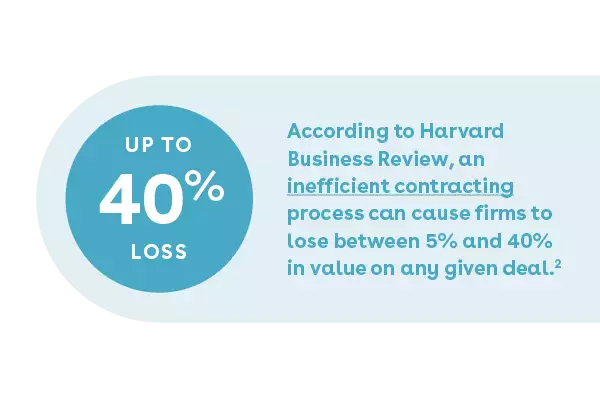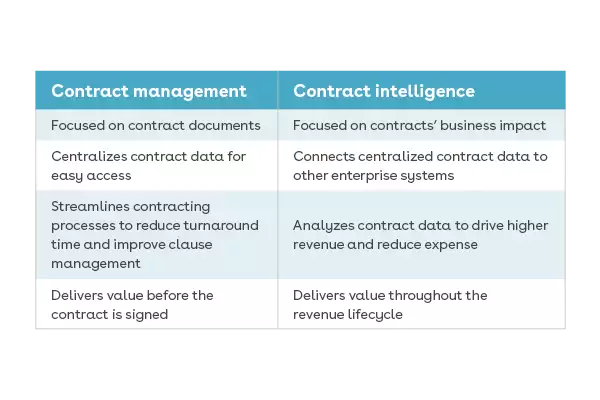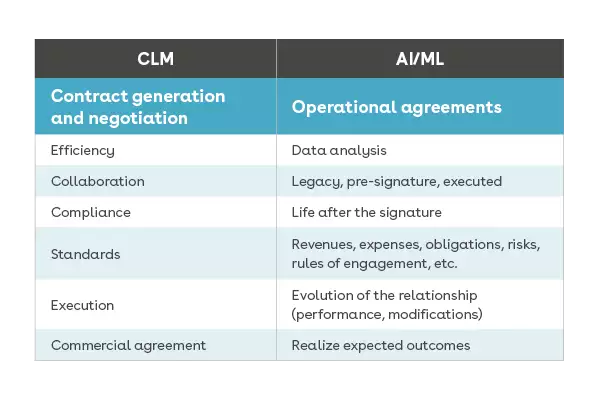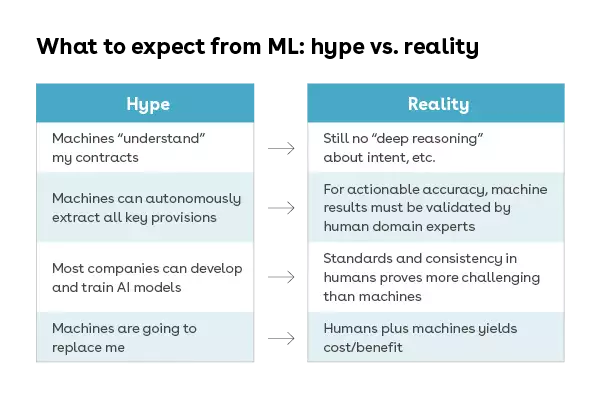
What is contract intelligence?
FREE GUIDE
Ultimate guide to contract intelligence
Putting current, accurate, and relevant contract information in the hands of responsible decision-makers can significantly impact business performance. However, accessing such data presents a challenge for most companies, especially when this critical information is in the form of unstructured text buried in thousands of legal agreements.
Whether it’s a five-page nondisclosure agreement (NDA) that you authored years ago or a newly executed 100-page master services agreement (MSA) on your supplier’s paper, accurately extracting the full scope of governing terms is expensive, inconsistent, and requires skilled resources.
That’s where contract intelligence comes into play.
Contract intelligence incorporates artificial intelligence (AI) tools for contract ingestion and analysis. It allows you to easily upload contracts previously living outside of your contract lifecycle management (CLM) system—on paper, in SharePoint, or on a drive—into the CLM to run analysis and manage contracts in a searchable, central repository. It leverages the most advanced machine learning (ML) with attorney verification to identify, extract, transform, and validate content from contracts protecting stakeholders from legal issues and contract breach risks.
Challenges within your contracts
Have you ever lost a client (and thus, revenue) by being too slow to process contract information post-signature—or lacked the key insights needed to close a deal?
According to a survey by Deloitte,1 risks associated with outdated contract management processes include:
- Unwanted termination or rollover of contracts
- Legal action and/or breach of contract because of unrealized obligations
- Missing important dates and deadlines
- Regulatory fines
- Unclear roles and responsibilities
- Difficulty finding contracts and tracking key data
- Manual, slow processes required to find, extract, and update contract information post-signature
- Missed milestones and obligations, including auto-renewals
- Exposure to liability and risk due to lack of visibility into contracts
- Revenue lost from poor contract management
Contract intelligence is the key to unlocking real change within your contracts and doing away with outdated processes. It extracts commercial terms and transforms them into verified data that drives your business’ performance. Find information about any agreement in seconds using a contextual topic search. Or locate the data you need with filterable, customizable dashboards.
Most companies don’t think much about it until there’s a problem. Recognize revenue faster, never miss a renewal date, and add a layer of protection to your contracting process. It’s fast, it’s easy, it’s accurate, and it immediately frees up time and allows you to focus on the more specialized parts of your job.

Contract management vs. contract intelligence
At this point you may be wondering, “What’s the different between contract intelligence and contract management?” They may seem the same at first glance, but they’re actually quite different.
Contract intelligence is more than just a buzzword or an alternate term for contract management. It’s a new development in contract lifecycle management, with expanded capabilities and greater potential to directly impact a company’s bottom line.

What are AI and ML? And how do they make contract intelligence work?
AI and ML are the foundation of contract intelligence. To better understand what that means, let’s start with an important distinction:
- AI is the umbrella term for creating intelligent machines.
- ML is a subset of AI that enables systems to automatically learn and improve from experience, without being programmed to do so.
The ML component allows you to extract key data from your contracts, and in return, review contracts faster, streamline negotiations, and gain visibility into your contractual obligations.
How does ML help when it comes to the contracting process? Contract intelligence is an extension of CLM software. CLM and AI work together to create a streamlined, automated process.

An example would be if a customer asks, “By what date must we send the Termination Notice to cancel the agreement?” The machine will:
- Extract an effective date
- Determine a time period
- Extract an expiration date
- Determine a current date
- Extract a renewal type
- Extract a renewal period
- Calculate a new expiration date
- Extract a notice period

What to look for in a contract intelligence tool
When choosing the right contract intelligence tool, it’s important to find one that’s well, intelligent. Here are some of the key features you should look for in a contract intelligence solution:
- Accuracy. Human review validates data accuracy and continually trains the AI to be even better.
- Centralized repository. Find information about any agreement in seconds using contextual search. Or locate the data you need with filterable, customizable dashboards.
- Advanced insights. Stay on top of contracts with alerts before every date-driven event, with negotiation insights before renewals, and with risk reports that pinpoint areas of concern.
- Contract analytics. See how contract terms are affecting your business, which vendors and customers cost you the most, and how contracts perform by department.
- Integrated workflows. Get actionable insights instantly to your teams using native integrations.
5 benefits of an effective contract intelligence tool
Teams—particularly legal and finance—see a variety of benefits from contract intelligence. Here are the top benefits of an intelligent CLM solution:
- Maximize the value of every agreement. Contract intelligence enables teams to quickly audit and act upon massive databases of contracts with ease and efficiency. In fact, it has been estimated that teams save almost one day a week of administrative work per employee.
- Capture every revenue opportunity. Advanced ML extracts data-driven events and distills complex contract data into an easy-to-use dashboard.
- Avoid surprise expenses. Get proactive alerts before any key event that will affect your budget, like the auto-renewal of a contract you no longer want to pay for.
- Minimize liability exposure. Avoid risk by reliably meeting SLAs and lowering the likelihood of penalties or unforeseen expenses.
- Eliminate costly manual work. End manual data entry and information-seeking. Automate key operations tasks and gain immediate access to answers.
Best practices: preparing for a clean and organized deployment
Conga Contract Intelligence is a powerful solution that saves organizations time and money. However, you will need to consider a few best practices before jumping right in to ensure that your kickoff is as successful as possible.
Review the best practices below to prepare for a clean and organized deployment.
- Get organized! Prior to upload, it’s important to organize the current database of contracts—this helps your upload strategy and informs any auditing before upload.
- Check legacy systems.
- Check where every team is storing their latest templates.
- Consider naming conventions. This is a perfect time to consider or reconsider naming conventions to aid content organization; however, don’t let it slow you down. Some organizations fall into analysis paralysis, which can derail implementation, so stay focused and keep it simple and clear.
- Identify stakeholders in key departments to ensure buy-in/ ownership. It’s also helpful to specify roles (who will take action on data) and consider key groups to involve (e.g., legal, finance, sales, renewals, human resources, and procurement).
Once you have gathered the key team, take the time to get organized for a fresh start, and consider proper naming conventions, you’ll be ready to dive into the solution. It won’t be long before you’re taking advantage of the capabilities because once everything is organized, there is no lengthy implementation process. You can benefit from the solution from day one.
Is contract intelligence software worth it?
The truth is, every organization will have to decide for itself whether contract intelligence is worth the investment. However, for many enterprise-level businesses that have already implemented a CLM solution, contract intelligence can take that technology to the next level and make a direct impact on the bottom line.
Contract intelligence provides unmatched value in terms of visibility, scalability, and performance:
Visibility: Contract intelligence tools offer clear visibility into the mountains of data hidden within your contracts, On-demand data extraction allows leaders across the organization to unlock deep insights at a moment’s notice, for more agile and informed decision making.
Scale: AI-powered contract technology is “trained” on millions of contracts and ML capabilities allow the tool to continue learning as your organization grows. In practical terms, this means contract intelligence can build current, compliant contract language and identify exceptions that require human review—without tying up your legal team’s valuable time.
Performance: Contract intelligence helps organizations maximize the performance of every contract, ultimately increasing revenue and reducing cost. It does this by actively monitoring contracts to ensure that all terms and conditions are honored, prevent missed obligations, and avoid revenue leakage from unwanted renewals. Contract intelligence also minimizes the time and effort spent on contracts, shortening the contract cycle and accelerating time to close.
Contract intelligence in action
Following are some use cases that demonstrate the true power of contract intelligence:
Managing renewals
Managing renewals and termination dates is the baseline for most clients using contract intelligence. It helps organizations understand the fundamentals including who the parties in the contract are, who the contract is for, when it begins/ends, and what must be done to renew or terminate the contract.
With Conga Contract Intelligence, legal teams reclaim valuable time. For example, Thoughtworks estimates they save 1,400 hours annually with Conga Contract Intelligence. Other benefits include higher accuracy levels and the ability to automatically create triggers and alerts based on actionable dates.
Thoughtworks, Homelight, and Ovation TV are just some of the organizations that have used Conga Contract Intelligence to successfully and accurately manage their renewals.
One of the ways Contract Wrangler [Conga Contract Intelligence] saves us money is by catching autorenewals. It more than pays for itself with this alone.
Mergers and acquisitions (M&A)
Organizations having events such as M&A, fundraising campaigns, and special purpose acquisition companies (SPACs) need to run due diligence through their current contracts; identifying risk, exposure, and revenue. Conga provides a due diligence package that highlights clauses such as Assignability, Audit Rights, Confidentiality, Governing Law, and more.
With Conga Contract Intelligence, customers like Lucid saw reduced outsourced billable hours by 50% and streamlined the process of contract integration of newly acquired companies.
A lot of other tools do one thing—there’s no big picture. Conga Contract Intelligence is thinking ahead, listening to customers, and taking that feedback. It’s very much a partnership.
Price increase
Conga Contract Intelligence easily allows clients to identify which contracts permit price increases at certain intervals of time, whether such increases are capped, and whether such increases require consent or contain particular notification requirements.
For price increases within contracts, Conga Contract Intelligence allows clients to easily identify them and increase their reoccurring revenue. We predict a 1-3% increase in annual reoccurring revenue.
Our teams now have full control and visibility into the business through flexible reporting and analytics that we did not have before.
Recession risk analysis
With Conga Contract Intelligence, organizations can see which contracts are up for renewal in the next two to four quarters, forecast the revenue from them, and determine what portion of the company revenue comes from it.
This essentially futureproofs business and mitigates future risk, especially when faced with a possible recession.
Get started with Conga Contract Intelligence
Get the job done better with the right tool. Conga Contract Intelligence and Conga CLM address critical contracting processes that occur both before and after customers have signed. Before signature, contract intelligence helps to identify risk during the negotiation. By providing visibility into contract details during upload—including agreed-upon prices and expiration dates, automated contract intelligence also ensures that businesses can accurately manage and intelligently renew contracts. Bring any unmanaged contracts living outside of your central repository and during initial upload/ingestion, extract important data and meaning to provide lasting visibility and searchability in your contract lifecycle.
Put an end to the contract juggling act! Get a demo and learn more about how an intelligent solution can help you reduce risk and improve processes across your entire organization.
[1] Deloitte. (2016). Contract Intelligence | Protecting your business
[2] Harvard Business Review (2018) How AI is changing contracts
FREE GUIDE



